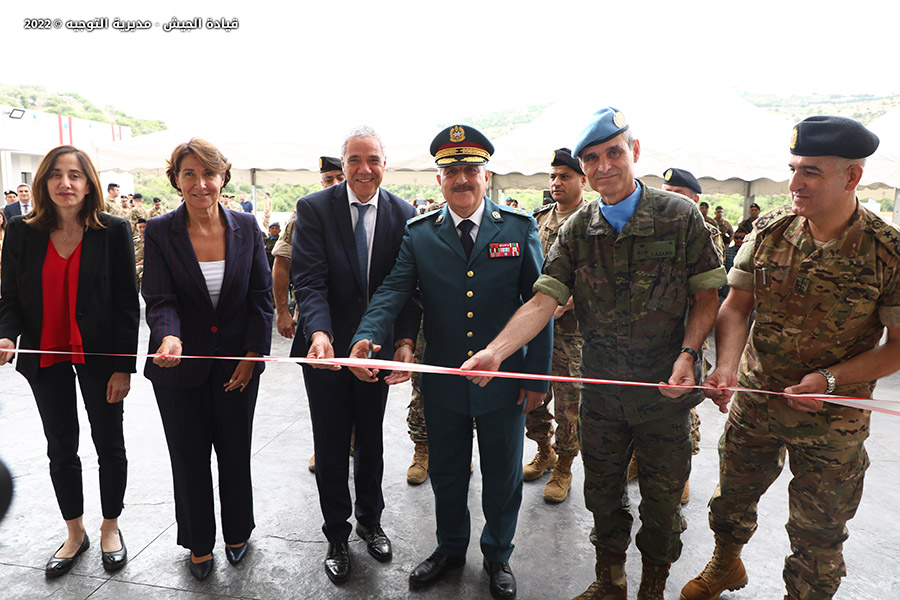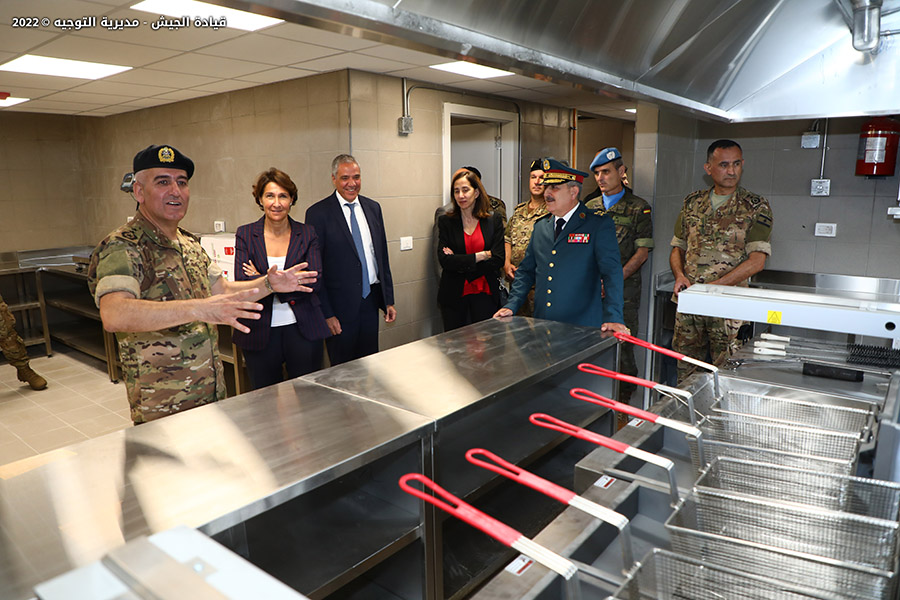Lebanon: a new command post to strengthen State presence in Southern Lebanon
This command post symbolises several decades of international commitment to stabilisation and peace in Lebanon. Indeed, since 2000 and in accordance with Resolutions 425 and 426 (1978) of the United Nations Security Council (UNSC), the United Nations Interim Force in Lebanon (UNIFIL) has been deployed in the area between the Litani River and the line of withdrawal of 2000, also called the “Blue Line”. Only two forces are authorised to operate in this area: the UNIFIL and the LAF. In August 2006, Resolution 1701 of the UNSC was adopted to end the conflict between the Lebanese and Israeli parties. It emphasised the importance for the Lebanese Government of extending its control throughout Lebanon. To this end, in 2017, Lebanon pledged to create a new infantry unit, the “Model Regiment”, via Resolution 2373. This unit will eventually have 1,400 soldiers and will be deployed in the area of operations of the UNIFIL, so that Lebanon can increase its joint patrols with it in the area.
Extract from Resolution 2373 of the United Nations Security Council, dealing with the “Model Regiment”
"The Security Council, welcoming the crucial role played by the Lebanese Armed Forces and security forces in extending and sustaining the authority of the Government of Lebanon, in particular in southern Lebanon, and responding to other security challenges, including the threat of terrorism […] Welcomes in this regard the intention of the Government of Lebanon to deploy a model regiment […] in UNIFIL’s area of operations to advance the implementation of resolution 1701 (2006) and the authority of the Lebanese State as noted in the 2016 2017 Strategic Review.”
The Model Regiment has been designed as a new unit, specifically conceived, recruited, trained and equipped for its mission in South Lebanon. It needs to have a high level of cooperation with the UNIFIL.
The Model Regiment is the first step towards the gradual handover of responsibilities from the UNIFIL to the LAF in the South. The regiment will be given an area of responsibility, will be able to develop cooperation with the UNIFIL, and should gradually take over certain responsibilities from it.

Support from the European Union
While the LAF hoped to start the deployment of this unit in 2018 and complete it in June 2020, their financial difficulties (including the stop to recruitment for five years) have considerably slowed down their ramp-up.
Consequently, to assist Lebanon with this effort, at the Rome II Conference in 2018, the European Union pledged to support it through a series of measures to strengthen the capabilities of the LAF. One of these measures specifically aims to support the construction and equipment of the Model Regiment’s command post, which will strengthen the presence of the Lebanese State in the south of the country over the long term.
In 2019, the European Union mandated Expertise France to implement this measure and work with the Lebanese Armed Forces on the construction of the infrastructure following the identification of a plot in the town of Srebbine. On 21 October 2019, the “Consolidating the Presence of the Lebanese State South of Litani River” project was officially launched for an initial duration of 18 months with a total amount of €6 million.
However, the implementation of the project has been slowed by difficulties related to the international and local situation. Indeed, the project was suspended twice due to the Covid-19 pandemic: the health context made it impossible to implement certain essential activities, such as the preparation of the design for the infrastructure and works. The socioeconomic crisis in Lebanon also caused delays: the various shortages (electricity, fuel, materials) had an impact on the implementation of various contracts. The European Union granted two extensions without any cost to allow the completion of the project’s activities. In spite of everything, the project has reached completion in 2022, thanks to the involvement of the Lebanese party, the support from the European donor and the professionalism of the companies.

A command post ready to host the new Model Regiment
During these two and a half years, Expertise France has worked hand-in-hand with the LAF on designing infrastructure tailored to their needs. The Model Regiment’s command post has been built on the foundations of a building which was there before and comprises all the functions and services the Lebanese Armed Forces need in terms of headquarters, operations, accommodation and logistics. This 6,000 m2 command post can accommodate up to 300 personnel.
During the inauguration of the building, the LAF Chief of Staff Major General Amin El Erem pointed out that the realisation of this project was “a crucial step towards the development of the Model Regiment and the operationalisation of its capacity to carry out its missions in the south of Lebanon, which will have a positive effect on the performance of the army in general.”
Major General Aroldo Lázaro, Commander of the UNIFIL, Ralph Tarraf, Ambassador of the EU to Lebanon, and Anne Grillo, Ambassador of France to Lebanon, were also present. They had come to celebrate this new stage for the stability of Lebanon.
They all highlighted the remarkable work carried out by all the parties that worked on the implementation of this project. Rima Le Coguic in particular commended the excellent cooperation between all the parties, saying “If it’s possible to see today the remarkable results achieved in Srebbine, it’s because all the partners have worked hand-in-hand.”
The Ambassador of France in turn said that this project financed by the EU and implemented by Expertise France was “an example of the efforts which have been coordinated at European level to support Lebanon, its security forces and stability in the south” of its territory and that “France will remain committed to this project for which the construction of the command post is only the beginning.”
Finally, the personalities present also called for the operationalisation of the Model Regiment. In addition, the Commander of the UNIFIL highlighted the need to move on to the “deployment, equipment and training” stage now that all the conditions are in place.
Photos credits: FINUL, FAL and Antoine Baakliny

